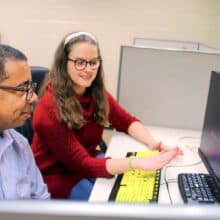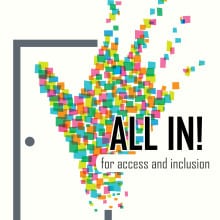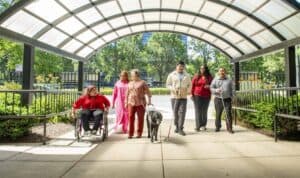Roundup: Emergency Preparedness for People with Disabilities
Guest Blogger Tyler Bachelder
In light of the tragic and devastating results of hurricanes Harvey, Irma and Maria, we at The Chicago Lighthouse would like to offer our sincerest condolences to all who have been effected in the United States and across the world. Disaster preparedness is important for everyone, but especially so for people with disabilities, as our needs vary so widely. With that in mind, I’ve compiled some resources to help in planning for events like these. Nobody can predict the future, but if we ask the right questions, we can be ready for it.
So what are the right questions, exactly? That’s determined by your own needs and situation. Most of the resources below will help you consider your needs and may shine a light on the unconsidered ones. Taking the time to think about those needs can mean the difference between panic and calm, and remaining calm is vital in an emergency. It is important for everyone to do a few very basic things. Prepare an emergency kit with first aid supplies, non-perishable food, water, backup batteries, flashlights, a radio or other means of getting the news, some basic tools, and other essentials.
As a person with a disability, your kit may be more extensive. Make sure you have access to your most important contacts in a format accessible to you, whether that be Braille, large print, an audio recording, or whatever suits your needs. Family and friends are the first and best means of support if you have a disability, as they know your needs better than emergency responders will. If you have a service animal, consider its needs. Do you have food, water, and the equipment needed to work with the animal? What about identification tags? Do you use any equipment that is necessary for you to live, such as a dialysis machine? If so, how will you power it in the event you lose access to electricity? If blind, do you have a spare cane? If in a powered wheelchair, do you have a lightweight manual one available to you? Is your environment easy for you to navigate quickly? Are emergency exits unobstructed?
As you can see, the needs of people with disabilities are quite complex. Although no one source can ask or answer every question, these tips are a good starting point.
Resources.
•The National Rehabilitation Information Center wrote a blog post to help Harvey survivors with disabilities find needed resources during the recovery process.
• The American Foundation for the Blind offers a general overview on emergency preparedness with further links to resources at the end of the article including those from the CDC, Red Cross, and more.
• Writing for the Vision Aware blog, Maureen Duffy discusses the importance of emergency preparedness with a focus on her harrowing personal experience with flooding.
• FEMA is required by law to provide accessible services at its disaster recovery centers so that people with disabilities can be made aware of the resources available to them. Here is an overview (pdf) of the services offered at their recovery sites for disabled people.
• Oregon’s Business Continuity Management Program, a division of the Department of Human Services, has a list of guides for businesses and organizations to better serve the disabled population in the event of an emergency, but they also feature guides for individuals as well.
We cannot stop emergencies from happening, as they are an inevitability of life. But with preparedness, we can mitigate their impact. Being prepared also means being calm and confident in a difficult situation, and a calm person is better able to take care of themselves and others. The more of us who can do that, the better off we are as a community. And when we move forward into the long and difficult rebuilding process, it’s the communities that matter the most.

Sandy Murillo works at The Chicago Lighthouse, an organization serving the blind and visually impaired. She is the author of Sandy’s View, a bi-weekly Lighthouse blog about blindness and low vision. The blog covers topics of interest to those living with blindness and vision impairments. Being a blind journalist and blogger herself, Sandy shares her unique perspective about ways to live and cope with vision loss.





